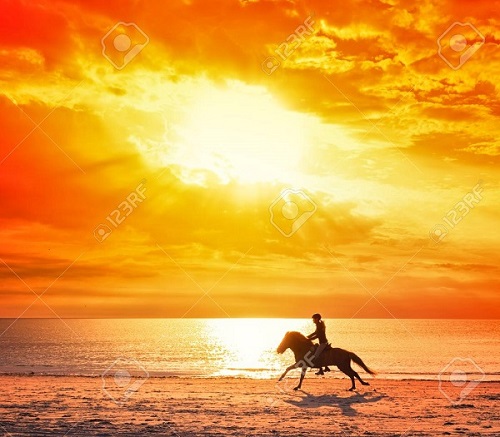FWP:
SETS == GROTESQUERIE; WORDPLAY
DESERT: {3,1}
INDEPENDENCE: {9,1}
For background see S. R. Faruqi's choices. For more on Ghalib's unpublished verses, see the discussion in {4,8x}.
A noun compound like 'sweat-steed' is rare in Urdu, but common in Persian; for discussion, see {129,6x}. A steed consisting of, or identified with, sweat-- let's face it, that's a pretty distracting and unappetizing image. Since its grossness gets in the way of poetic effectiveness, it fits my (subjective, exploratory) category of 'grotesquerie'.
Or if we want to read the construction as a case of 'loss of the izafat' [faq-e i.zaafat] (on this see {81,8x}), then it would become 'the sweat (of the) steed of courage'. This is how the commentators read it, and it's not quite as grotesque (though the image of a flood of horse-sweat isn't really all that attractive either).
One of the metaphors for achieving a state of mystical beyondness and self-lessness is that of having one's (preferably desert-located) 'house' swept away in a 'torrent' or 'flood'; for a classic example, see {15,10}. The permutation imagined in the present verse seems to be that the mystical seeker, after exhausting and overheating himself while traversing the desert/wilderness of 'searching', is finally swept out of the saddle by a 'torrent, flood'-- not of insight or Divine love, but of his own and/or his horse's sweat. (Such a notion is perfectly in accord with Ghalib's penchant for insisting on 'indepencence' at all costs.)
But basically, this is a verse of wordplay. The cleverly exploited term 'chamber of the saddle' [;xaanah-e zii;N] is perfectly placed to unite the two images of the horse and the (flooded-out) house; and in classic mushairah-verse style, it's positioned at the last possible moment, in 'punch-word' position, at the end of the second line. Without it, how could the verse fail to fall apart? Let's be grateful to Gyan Chand for thinking to mention that 'they call the curve of the saddle the 'saddle-chamber'.'

Asi:
Oh Ghalib, after the desert/wilderness of seeking comes the desert of oblivion. The sweat of the steed of courage sweeps away the 'saddle-chamber'. That is, after this state/condition comes the state/condition of detachment.
== Asi, p. 267